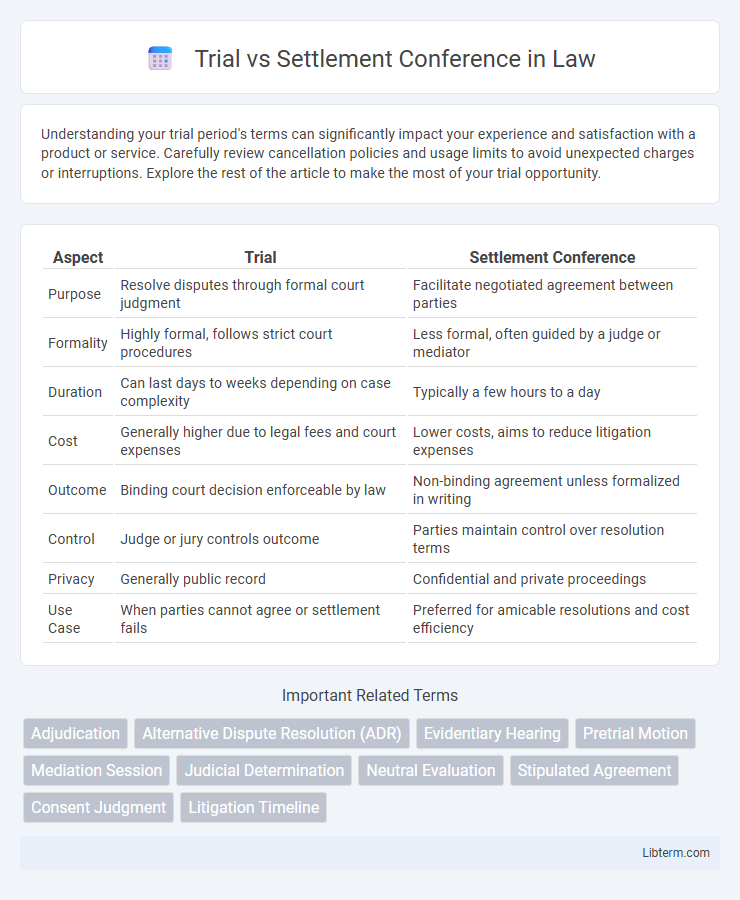Understanding your trial period's terms can significantly impact your experience and satisfaction with a product or service. Carefully review cancellation policies and usage limits to avoid unexpected charges or interruptions. Explore the rest of the article to make the most of your trial opportunity.
Table of Comparison
| Aspect | Trial | Settlement Conference |
|---|---|---|
| Purpose | Resolve disputes through formal court judgment | Facilitate negotiated agreement between parties |
| Formality | Highly formal, follows strict court procedures | Less formal, often guided by a judge or mediator |
| Duration | Can last days to weeks depending on case complexity | Typically a few hours to a day |
| Cost | Generally higher due to legal fees and court expenses | Lower costs, aims to reduce litigation expenses |
| Outcome | Binding court decision enforceable by law | Non-binding agreement unless formalized in writing |
| Control | Judge or jury controls outcome | Parties maintain control over resolution terms |
| Privacy | Generally public record | Confidential and private proceedings |
| Use Case | When parties cannot agree or settlement fails | Preferred for amicable resolutions and cost efficiency |
Understanding Trial and Settlement Conference
A trial is a formal judicial proceeding where both parties present evidence and arguments before a judge or jury to resolve a dispute legally and definitively. A settlement conference is a less formal meeting facilitated by a judge or neutral third party aimed at helping parties negotiate a mutually agreeable resolution without going to trial. Understanding the differences between trial and settlement conference helps parties choose efficient dispute resolution strategies to save time, reduce costs, and manage litigation risks effectively.
Key Differences Between Trials and Settlement Conferences
Trials involve a formal judicial process where both parties present evidence and arguments before a judge or jury for a binding decision, while settlement conferences are private meetings aimed at negotiating a mutually agreeable resolution without proceeding to trial. Trials are typically more time-consuming and costly, requiring strict procedural rules and presentation of evidence, whereas settlement conferences emphasize collaboration, confidentiality, and flexibility to explore potential compromises. The outcome of a trial is a legally enforceable judgment, whereas settlement conferences result in agreements that depend on the voluntary consent of the parties involved.
Objectives of Settlement Conferences
Settlement conferences aim to resolve disputes efficiently by encouraging negotiation and fostering communication between parties outside of formal trial procedures. Their primary objective is to reduce court caseloads, save time, and minimize legal expenses by facilitating mutually agreeable solutions. These conferences often lead to binding agreements that prevent the need for a trial, promoting faster conflict resolution and preserving relationships.
Legal Process: Trial vs Settlement Conference
The legal process during a trial involves presenting evidence, witness testimonies, and legal arguments before a judge or jury to reach a binding verdict. In contrast, a settlement conference serves as a negotiation meeting overseen by a judge or neutral mediator aiming to resolve disputes without proceeding to a formal trial. The settlement conference prioritizes exploring potential compromises, reducing litigation costs, and expediting case resolution.
Advantages of Going to Trial
Going to trial provides the advantage of a formal judicial decision allowing both parties to present evidence and legal arguments before an impartial judge or jury. This process can result in a binding verdict that may offer a more favorable resolution than settlement offers. Trial proceedings also establish public records and legal precedents that can benefit future related cases.
Benefits of Settlement Conferences
Settlement conferences significantly reduce litigation costs and expedite dispute resolution by encouraging parties to negotiate and reach mutual agreements without a full trial. These conferences foster open communication and facilitate creative solutions tailored to the specific needs of both parties, enhancing the likelihood of satisfaction with the outcome. Courts benefit from decreased caseloads, allowing judicial resources to focus on cases that require formal trials.
When to Choose Trial Over Settlement
Choosing a trial over a settlement conference is advisable when parties seek a definitive legal precedent or when disputes involve complex factual issues that cannot be adequately resolved through negotiation. Trials are preferred if prior settlement attempts have failed, and the parties require a formal adjudication by a judge or jury to ensure enforceable and binding outcomes. Selecting trial is also strategic when monetary compensation or specific performance is essential, and parties want a transparent resolution process under court supervision.
Common Outcomes in Trials and Settlement Conferences
Trials often result in verdicts based on evidence presented, with outcomes ranging from judgments in favor of the plaintiff or defendant to mistrials or hung juries. Settlement conferences commonly lead to negotiated resolutions, enabling parties to agree on compensation or terms without proceeding to a full trial. Both processes aim to resolve disputes but differ significantly in their mechanisms and finality of outcomes.
Factors Influencing the Decision: Trial or Settlement
Key factors influencing the decision between trial and settlement conference include case complexity, evidence strength, and potential financial outcomes. Parties often weigh the predictability of a settlement against the uncertainty and cost of a trial. Risk tolerance, legal fees, time constraints, and the desire for a public resolution also significantly impact the choice.
How to Prepare for a Trial or Settlement Conference
Preparing for a trial or settlement conference requires organizing all relevant documents, evidence, and witness statements to present a clear and compelling case. Understanding the legal issues, reviewing case law, and anticipating opposing arguments enhance readiness and negotiation leverage during a settlement conference. Engaging with legal counsel to develop a strong strategy and rehearse key points ensures confident and effective participation in both trial and settlement proceedings.
Trial Infographic

 libterm.com
libterm.com